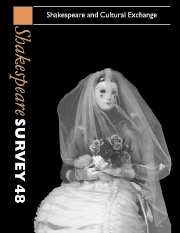Book contents
- Frontmatter
- Shakespeare Translation as Cultural Exchange
- Shakespeare, Theatre Production, and Cultural Politics
- ‘Amphitheaters in the Body’: Playing with Hands on the Shakespearian Stage
- ‘Shakespur and the Jewbill’
- Wilhelm S and Shylock
- Pilgrims of Grace: Henry IV Historicized
- Holy war in Henry V
- Hamlet and the Anxiety of Modern Japan
- Hamlet’s Last Words
- Venetian Culture and the Politics of Othello
- ‘My Music for Nothing’: Musical Negotiations in The Tempest
- The Tempest and Cultural Exchange
- Caliban and Ariel Write Back
- Shakespearian Rates of Exchange in Czechoslovakia 1945–1989
- ‘Are you a Party in this Business?’ Consolidation and Subversion in East German Shakespeare Productions
- The Martyred Knights of Georgian Shakespeariana
- Shakespeare Performances in England, 1993–1994
- Professional Shakespeare Productions in the British Isles, January – December 1993
- 1 Critical Studies
- 2 Shakespeare’s Life, Times, and Stage
- 3 Editions and Textual Studies
- Books Received
- Index
1 - Critical Studies
Published online by Cambridge University Press: 28 March 2007
- Frontmatter
- Shakespeare Translation as Cultural Exchange
- Shakespeare, Theatre Production, and Cultural Politics
- ‘Amphitheaters in the Body’: Playing with Hands on the Shakespearian Stage
- ‘Shakespur and the Jewbill’
- Wilhelm S and Shylock
- Pilgrims of Grace: Henry IV Historicized
- Holy war in Henry V
- Hamlet and the Anxiety of Modern Japan
- Hamlet’s Last Words
- Venetian Culture and the Politics of Othello
- ‘My Music for Nothing’: Musical Negotiations in The Tempest
- The Tempest and Cultural Exchange
- Caliban and Ariel Write Back
- Shakespearian Rates of Exchange in Czechoslovakia 1945–1989
- ‘Are you a Party in this Business?’ Consolidation and Subversion in East German Shakespeare Productions
- The Martyred Knights of Georgian Shakespeariana
- Shakespeare Performances in England, 1993–1994
- Professional Shakespeare Productions in the British Isles, January – December 1993
- 1 Critical Studies
- 2 Shakespeare’s Life, Times, and Stage
- 3 Editions and Textual Studies
- Books Received
- Index
Summary
GENERAL STUDIES AND COLLECTIONS
The core of Graham Bradshaw’s Misrepresentations: Shakespeare and the Materialists (Ithaca and London: Cornell University Press, 1993) is a lengthy and detailed reading of two plays, Henry V and Othello, which continues the emphasis of his earlier book, Shakespeare’s Scepticism (1987) on the multiple perspectives and ‘challenging intricacy and complexity’ of the plays’ dramatic thinking. Bradshaw writes illuminatingly on both plays, but it is the book’s other concern – to challenge both American new historicism and British cultural materialism and to expose what he sees as their deficiencies – which will no doubt command more attention. In a sometimes witty, sometimes acerbic, and occasionally downright ungracious fashion Bradshaw berates both schools for delimiting the richness and diversity of the plays’ effects through their importation of a prior agenda to their discussion. Both schools, he contends, posit a ‘Them and Us’ – new historicism by its emphasis upon the estrangement of the texts of the past from our present, cultural materialism by its creation of a fake ‘liberal humanist’ Them as against politically conscious (or ‘compassionate Sussex Marxist’) Us. There is justice in some of the attacks he makes upon inattentive and partial readings, though there is, too, a good deal of caricature, particularly of cultural materialist positions. But the book as a whole sidesteps the urgency with which both schools of criticism wish to deal directly with the implication of the readers' own cultural or political position for their readings of texts. Which is not to say that Bradshaw's claims for attentive reading, founded in a view of 'Shakespeare as the directing intelligence at work within the work' do not have their own political agenda. His celebration of a sceptical, interrogative Shakespeare is, as he would acknowledge, itself inevitably historically and culturally determined. But so too, one might think, is the nature of his polemic, so much more intemperate at the expense of British critics, near neighbours in academia, than it is of the Americans.
- Type
- Chapter
- Information
- Shakespeare Survey , pp. 239 - 255Publisher: Cambridge University PressPrint publication year: 1996



